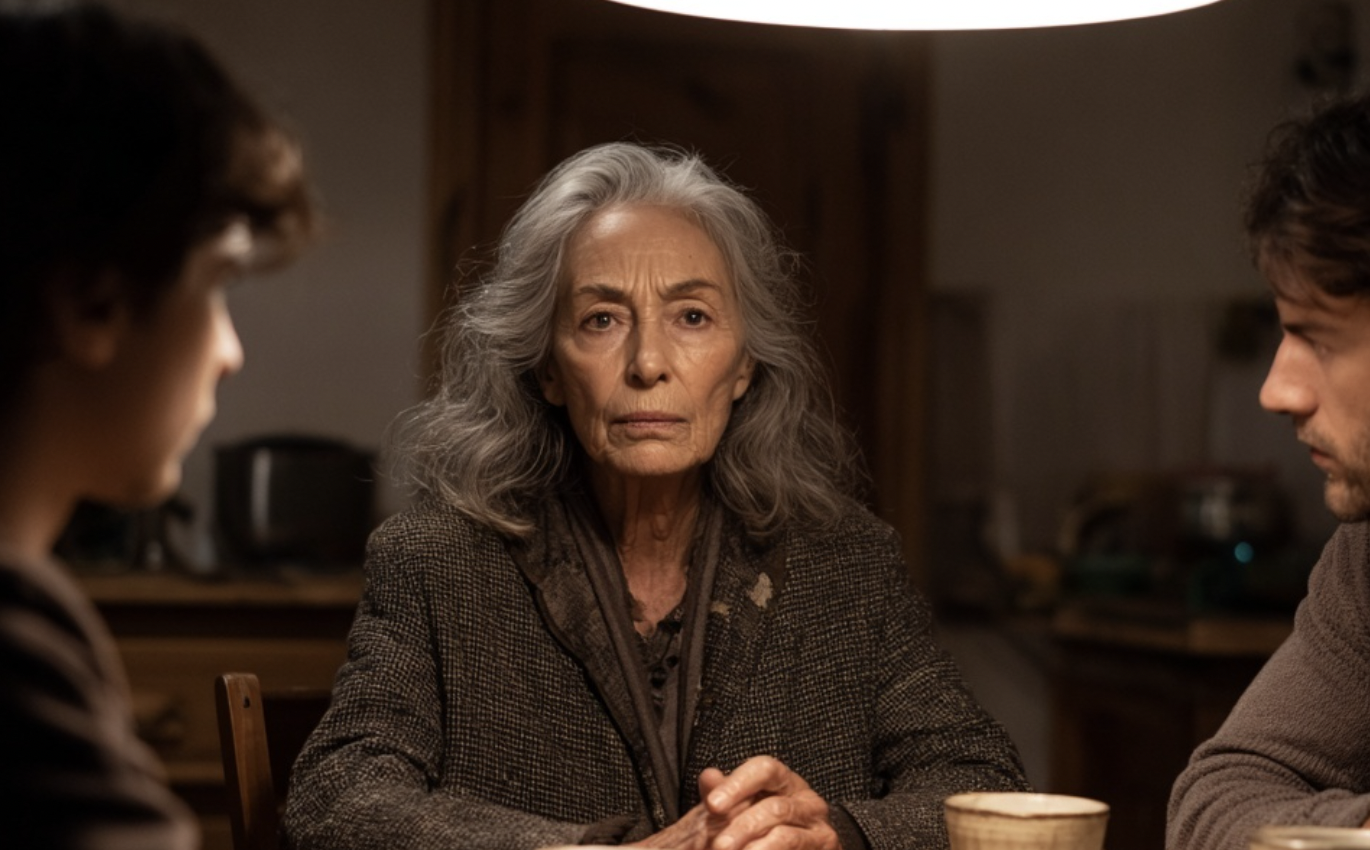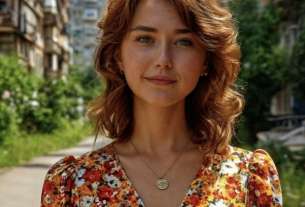“Switch apartments with your brother—he has a family, and you don’t need such a big place!” Maria Viktorovna stirred her instant coffee briskly without looking at her son.
Andrei tore himself away from his phone. From the next room came the crash of cartoons and shrieking children. The air was saturated with the smell of fried fish—his mother was cooking pollock for the grandkids.
“Mom, are you serious?” he finally managed.
“What’s so strange about that?” Maria Viktorovna shot him an indignant look. “Kirill and Lena with three kids are cramped in a studio, and you two live in a three-room apartment. It’s only logical!”
Andrei opened his mouth to reply, but a loud clatter came from the hallway—judging by the sound, the coat rack had fallen.
“Graaaandma!” a child’s voice screamed. “Timka pushed me!”
Maria Viktorovna jumped up and ran to separate the grandkids, throwing over her shoulder:
“Talk it over with Olga. It would be the right thing to do—as family!”
That evening Andrei stood in the middle of his kitchen—spacious, bright, with a new cappuccino-colored set—and tried to process what he’d heard. Olga was making dinner, slicing vegetables for a salad.
“Her again?” his wife asked without turning around.
“Now she’s directly suggesting we swap apartments.”
The knife froze in the air. Olga turned slowly.
“With Kirill? Our three-room place for their studio?”
“Exactly.”
Andrei sat at the table and rubbed his temples. He was forty-two, but in moments like these he felt ancient. The story with his brother had stretched through his entire conscious life.
Kirill was born when Andrei was thirteen. A late, hard-won, long-awaited child—his mother had him at forty after years of trying. Andrei remembered how the house changed when the baby appeared. Before, Mom checked his homework, Dad took him fishing. After, there were only the baby’s cries, endless diapers, and the phrase: “Andryusha, you’re big now, you can manage on your own.”
He managed. He did his homework, made his own breakfasts, washed his school uniform. At his graduation, his parents sat with vacant expressions—four-year-old Kirill had come down with chickenpox and they were worried how he was doing without them.
At Andrei and Olga’s wedding ten years ago, the story repeated itself. His parents came, gave an envelope with five thousand rubles, and spent the entire evening discussing which institute Kirill would get into.
“You know what hurts the most?” Andrei said to his wife after the banquet. “They didn’t even notice how beautiful your dress was.”
Olga hugged him and said nothing. What was there to say?
In the years that followed, Andrei and Olga built their life themselves. They set aside money from every paycheck, skipped vacations, took evening side gigs. In three years they saved up for a down payment. The apartment they bought was in a new building—bare walls, concrete floors, a view of a vacant lot.
“But it’s ours,” Olga said then, hugging her husband in the middle of the empty room.
They did the renovations themselves. Andrei learned to lay laminate from YouTube videos; Olga mastered wallpapering. At the building-supply market they spent hours picking tile for the bathroom.
“Beige is boring!” Olga insisted.
“And blue isn’t practical!” Andrei countered.
In the end they bought gray with a pattern—a compromise they later laughed about.
They had a housewarming a year later. Friends were impressed, asked questions, took pictures against the kitchen backdrop. Andrei’s parents came for half an hour.
“The rooms are tiny,” Maria Viktorovna remarked, looking over the bedroom. “Kirill’s dorm room is roomier than this.”
“Mom, it’s a three-room apartment,” Andrei replied wearily.
“I don’t know what you measured here. Looks like a chicken coop to me.”
At that time Kirill was studying at the university—his parents paid for it, going into debt. In his third year he brought home Lena, a quiet girl from the provinces. Three months later it turned out Lena was pregnant.
They threw a lavish wedding—Maria Viktorovna borrowed money from anyone she could. No one even asked Andrei and Olga if they could come—they were simply presented with a fait accompli. The parents took out another loan for a studio for the young couple.
“Let them help,” Olga said then. “What’s it to us?”
But it did matter. Maria Viktorovna started calling more often. She talked less about the grandkids than about how hard things were for Kirill, how small the apartment was, how they didn’t have enough money.
“She’s plotting something,” Olga said after yet another call from her mother-in-law.
Andrei waved it off, but a nagging foreboding settled in him too.
On Sunday Kirill and his family showed up “to visit” without warning. Three kids—seven, five, and two—burst into the apartment like a hurricane. The oldest ran straight into the room where Andrei had set up his office and started yanking books off the shelves. The middle child found a toy push-cart in the hallway—Olga had bought it as a birthday gift for the neighbor’s daughter—and began riding it up and down the corridor. The youngest smeared chocolate all over the couch.
“Kirill, could you maybe keep an eye on them?” Olga asked, trying to scrub out the stain.
“Oh, come on, they’re just kids!” Kirill waved her off, sprawling in the armchair. “Now this is a place! A proper amount of space!”
Lena sat silently in the kitchen sipping tea. In two hours she’d said maybe ten words.
When the push-cart cracked in two under the weight of Kirill’s eldest, Andrei snapped:
“That’s it. Get your things together. We have plans today.”
“What plans on a Sunday?” his brother asked, surprised.
“Important ones.”
Kirill took offense but left. That evening, right on cue, Maria Viktorovna called.
“You saw how hard it is for them!” she started without preamble. “Three kids in one room! Wouldn’t it be the family-minded thing to share?”
“Mom, share what?” Andrei asked tiredly.
“What do you mean what? Living space! You have three rooms for two people, they have a studio for five. Swap and everyone will be happy!”
Andrei hung up without saying goodbye.
The “family council” was set for the next Saturday. Maria Viktorovna insisted everyone come. They were all already seated at the kitchen table: the parents, Kirill with Lena. The kids tore around the apartment, but no one paid them any attention.
“So,” Maria Viktorovna began solemnly, “we’re here to discuss an important matter. Kirill and his family need a proper apartment. And Andrei and Olga have extra living space. I propose a fair exchange—you move into the studio, they move into your three-room place. All fair, since they have children.”
Silence fell. Under the table, Olga squeezed Andrei’s hand.
“Fair?” Andrei repeated slowly. “Mom, you seriously think that’s fair?”
“What’s unfair about it? You have to help your own!”
Andrei stood up. The chair scraped across the linoleum.
“You know, Mom, I kept quiet for forty years. But that’s enough. When I needed help with homework—you were busy with Kirill. When I was applying to university—you were occupied with his preschool. You showed up to my wedding for half an hour, but for him you went into debt up to your ears. I don’t ask for anything. I never have. Olga and I built our life ourselves, bought our apartment ourselves, did our renovation ourselves. And now you want us to hand over the result of our work to someone who’s used to living at other people’s expense?”
“How can you be ashamed to talk about your brother like that!” Maria Viktorovna flared up.
“I’m telling the truth. Kirill is a grown man with three children. If he can’t provide for them, that’s his problem, not ours. We’re not going to trade our apartment for any studio. Period.”
“Andryukha, what’s with you?” Kirill piped up. “We’re family!”
“Family?” Andrei turned to his brother. “When was the last time you took an interest in my life? Do you know where I work? What I’m into? The names of my friends? To you I exist only as a source of benefits. First it was ‘loans’ you never repaid. Now it’s the apartment. What’s next?”
Maria Viktorovna opened and closed her mouth like a fish on the shore. Nikolai Petrovich, who had been silent all this time, cleared his throat:
“Maybe she’s right, Masha… This isn’t good…”
“So you’re all against me?!” Maria Viktorovna shouted. “I’m the one caring about the family!”
“No, Mom,” Andrei said quietly. “You’re caring about one son only. And to you I’ve remained that thirteen-year-old boy who ‘can manage on his own.’ Well, I managed. And I’ll keep managing. Without you.”
He took Olga by the hand.
“Let’s go home.”
They left to the sound of Maria Viktorovna’s shouts about ingratitude and cold-heartedness. In the elevator Olga hugged her husband tightly.
“I’m proud of you.”
“I should have said it long ago.”
The next weeks passed in blissful quiet. Maria Viktorovna called several times—crying into the phone, then cursing, then trying to guilt-trip them. Andrei answered curtly and politely: “Mom, we’ve discussed everything. The decision is final.”
Then the calls stopped. From mutual acquaintances Andrei learned that his parents were trying to sell the dacha to help Kirill expand his living space. He shrugged—that was their choice.
“Do you regret it?” Olga asked one day.
“Regret what? That I put them in their place? No. I only regret not doing it earlier.”
Half a year passed. A February evening. A blizzard outside, and in the Sokolovs’ kitchen it was warm and cozy. Olga sat curled up in an armchair reading a book. Andrei was finishing a work project on his laptop. A cat slept on the windowsill—they’d taken him in a month earlier from the entrance, skinny and frozen.
“Tea?” Olga asked.
“Sure.”
She got up and switched on the kettle. Magnets from their trips—Kazan, Sochi, Kaliningrad—hung on the fridge. They could afford every vacation now that they didn’t have to “lend” money to relatives.
“You know, I sometimes think,” Olga said, pouring the tea, “our apartment isn’t just square meters. It’s our fortress, our labor, our story. Every scratch on the parquet, every shelf—it’s all ours, earned, sweated over.”
“And no one has any right to lay claim to it,” Andrei agreed.
The phone stayed quiet. According to hearsay, Kirill’s family was still living in the studio. The parents sold the dacha, but the money covered only part of the debts. Maria Viktorovna no longer called.
“It’s sad, of course,” Andrei said, looking at the falling snow outside the window. “I would have liked a normal family. But…”
“But a normal family is the one we build ourselves,” Olga finished. “We have one. You and me. And Barsik.”
The cat cracked one eye open, as if confirming her words.
Andrei smiled and hugged his wife. A blizzard raged outside, but in their little fortress it was warm. And that warmth they had created themselves, with their own hands, not at someone else’s expense.
You can’t build happiness on someone else’s dime—this simple truth Maria Viktorovna never grasped. And Andrei and Olga knew it by heart.



